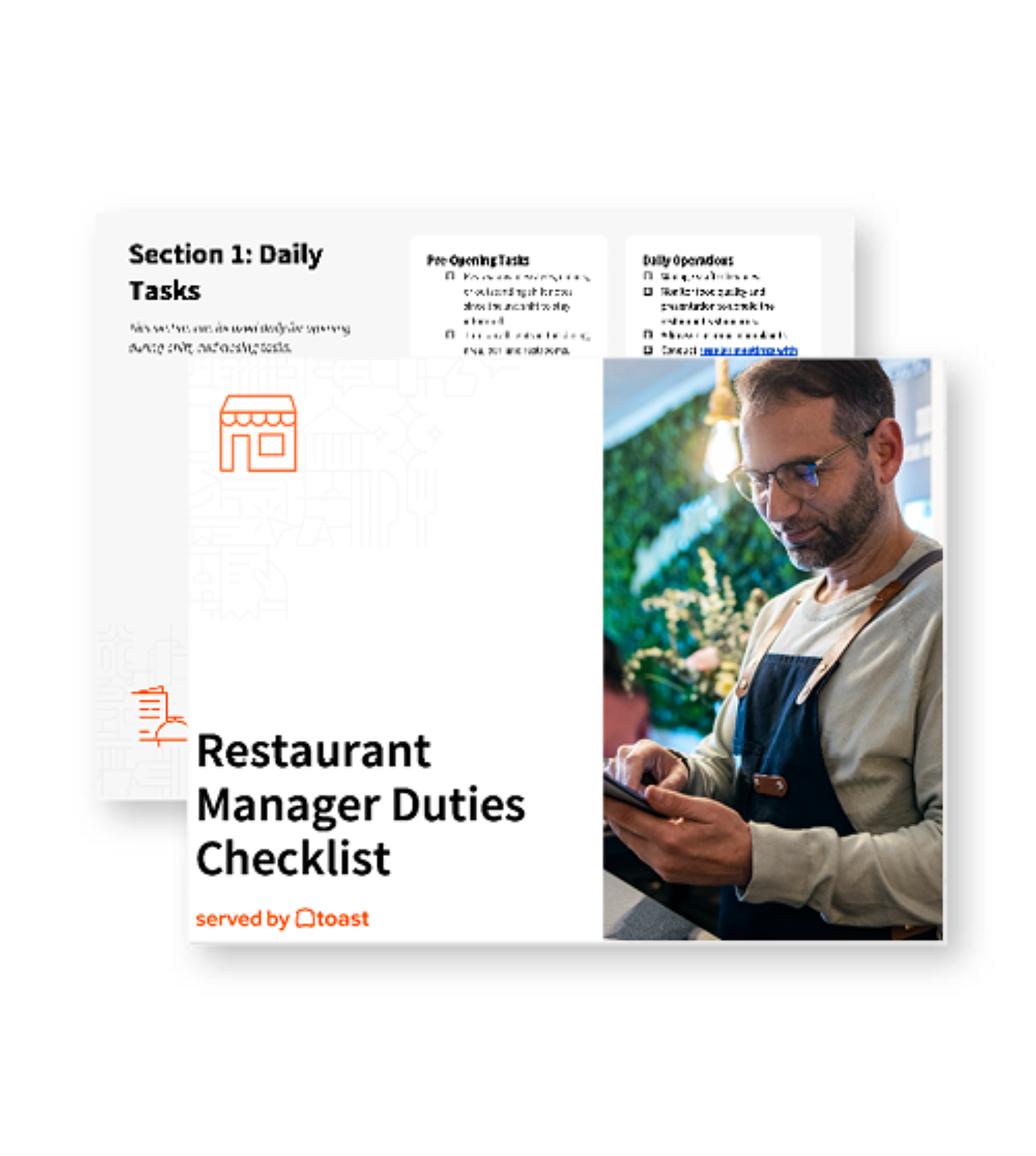
Restaurant Manager Duties Checklist: Restaurant Managers Role and Responsibilities
This checklist covers all the duties normally assumed by restaurant managers, including staff management, financial management, operations, customer service, and much more.
Marcel DeerAuthor


Restaurant Manager Duties Checklist
Use this free checklist to help streamline daily tasks, make sure weekly duties get completed, and ensure your manager stays organized.
Get free downloadOnce you find a great manager for your restaurant business, you’ll want to hold onto them. According to the National Restaurant Association, it can cost about $15,000 to recruit and train a new manager for your business, so it’s no wonder that you want to get the job done right.
A big part of that task is giving your manager a detailed job description with all their responsibilities clearly laid out for them. This not only helps you plan the division of responsibilities in your restaurant but also lets them know what’s expected of them and what their performance reviews will be based on. To that end, this article provides a comprehensive restaurant manager duties checklist, outlining key responsibilities and tips for success in each area.
In this article, you will find:
a comprehensive restaurant manager duties checklist
key responsibilities of a great manager
tips and tricks for managerial success
How to Manage a Restauarant
Improve the way you manage your restaurant's staff, operations, technology, finances, and everything else in between.

Restaurant Manager Duties Checklist
The restaurant manager duties checklist you use for your restaurant may differ from this example. After all, all businesses are different, and your checklist has to be specifically tailored to the needs of your restaurant. However, here are a few ideas and options to get you started.
Staff Management and Training
1. Hiring and Recruitment:
Most restaurants that aren’t franchises of big chains don’t have the resources to host their own dedicated HR departments. Therefore, the duties of recruitment and hiring of new staff normally fall to the restaurant manager. They develop job descriptions and conduct interviews for potential staff members to fill vacant positions on their team. To do this effectively, they need to implement strategies to attract and retain top talent. They must also ensure proper onboarding and training processes are in place for new hires so that they’re set up to succeed as soon as they join the team.
2. Staff Scheduling and Time Management:
Scheduling staff shifts and helping them manage their time effectively is the meat and potatoes of the restaurant manager’s job. They need to be able to create schedules that align with the restaurant's operational needs while considering employee preferences, so a lot of flexibility and compromise are needed in this capacity.
Once staff are scheduled and working, it’s the manager’s duty to monitor and manage their attendance and punctuality and ensure that staff are happy and well taken care of.
3. Training and Development:
Managers either have to train new hires themselves or arrange and guide training programs led by other staff members. However, training isn’t a one-time activity. Managers should provide ongoing training to improve staff performance and customer service. They can identify areas where additional training may be needed and develop programs accordingly.
Cross-training is another beneficial way to add value to a staff team by training them to do other jobs in the restaurant. This can improve team cohesion by helping staff understand the contributions and empathize with the challenges of their coworkers. It also has the practical benefit of allowing staff to fill shifts in a variety of areas if the need arises.
Operations and Customer Service
1. Ensuring Quality and Consistency:
While we might normally consider food quality the responsibility of the head chef, it actually falls under the purview of the restaurant manager. While maintaining quality can be the duty of the chef, establishing and monitoring those standards is the manager’s ultimate responsibility. This, of course, also holds true for standards of service, safety, and cleanliness.
An effective restaurant manager should regularly review and update standard operating procedures (SOPs) to ensure consistency. This keeps staff informed and gives them clear directions on how to do their work.
2. Inventory Management:
Monitoring inventory is often delegated to kitchen staff. However, once again, the duty of overseeing inventory levels, ordering, and stock rotation to minimize waste and ensure efficient operations falls to the manager.
A highly organized manager will make use of staff resources and delegate tasks. They’ll also implement inventory tracking systems to monitor product usage and prevent stockouts. Naturally, they’ll have to train staff to use these systems and monitor compliance.
3. Health and Safety Compliance:
All businesses in the food and beverage industry are strictly controlled by an array of local and state regulations relating to health, safety, and accessibility. In any restaurant, it’s the job of the manager to understand these regulations, create SOPs to help staff follow them, and monitor respect and compliance.
To do this, a restaurant manager can conduct regular inspections, implement safety protocols, and provide training to staff on health and safety procedures.
4. Customer Service Excellence:
Though great food is essential, it is by no means enough to make a restaurant successful all on its own. Every restaurant has to think one step above this and provide an exceptional customer experience that includes great food but also excellent service.
It’s up to the manager to train staff to provide customer service that contributes to a positive experience that will keep diners coming back for more. When issues inevitably arise, it’s the duty of the manager to address customer queries and complaints promptly and effectively, sending them away feeling positive and satisfied.
Financial Management
1. Budgeting and Cost Control:
Managing the restaurant’s finances is one of the essential responsibilities of the manager. This person has to have a great head for numbers to be able to develop and manage budgets for various expenses, including labor, food costs, and supplies. They should also know how to implement cost-control measures to minimize waste and improve profitability. Any savings they can create through increased efficiency, better pricing on supplies, or any other area can keep expenses down and increase profitability.
2. Sales and Revenue Management:
Who’s in charge of getting customers through the front door? Ultimately, it’s the manager’s duty to handle marketing to increase the restaurant’s customer base and sales to increase profits. To do this, they need to be able to effectively collect and analyze sales data and trends to identify areas for improvement. This can lead them to develop strategies to increase sales and revenue, such as promotional offers, targeted marketing, or training staff in upselling techniques. Bonuses for staff can help incentivize the whole team to help in this process.
3. Profit and Loss Analysis:
How will you know how well your restaurant’s doing without someone checking the numbers and doing some analysis? It’s usually the manager’s job, often in conjunction with the owner(s), to regularly review financial statements and assess the restaurant's financial health. This helps to indicate at what times and with which products the restaurant is doing well. If the numbers need to improve, this analysis can be used to identify areas of concern and implement corrective measures to maximize profits.
Communication and Leadership
1. Effective Communication:
Remember that the restaurant manager is the team captain. They’re the person who others look to for directions, advice, explanations, and creative solutions to problems. For this reason, an effective manager needs to be able to maintain open lines of communication with staff, ensuring clarity and transparency. They should also foster a positive work environment by actively listening to employee feedback and addressing concerns in order to keep staff happy and reduce turnover.
2. Leadership and Team Development:
As the head of the staff team, a restaurant manager needs to lead by example, setting high standards and demonstrating professionalism. They should have a strong work ethic and dedication and be hardworking to inspire their team members to work in the same way.
It’s important for a manager to be able to foster a positive work culture that promotes teamwork, respect, and personal growth. This helps staff feel seen, heard, and appreciated, and it greatly improves team cohesion.
3. Conflict Resolution and Problem-Solving:
One important skill shared by all great managers is the ability to solve problems and conflicts. When the team isn’t functioning smoothly, they can address conflicts or issues promptly and impartially.
They also use their skills to implement problem-solving techniques to resolve operational challenges effectively. These solutions always have to take the customer experience into account so that quality is never sacrificed.
Restaurant Manager Duties Checklist
No matter what kind of establishment they’re in charge of, a restaurant manager always has to wear many different hats, take on a wide assortment of responsibilities, and possess a varied skill set to be successful.
This restaurant manager duties checklist demonstrates the main responsibilities and qualities to look for in an exceptional manager to run your restaurant. While it might vary from business to business, the core elements of what a manager normally does should remain quite similar. When you can find someone capable of fulfilling all of these duties, you’ll never want to let them go!
Is this article helpful?
DISCLAIMER: This information is provided for general informational purposes only, and publication does not constitute an endorsement. Toast does not warrant the accuracy or completeness of any information, text, graphics, links, or other items contained within this content. Toast does not guarantee you will achieve any specific results if you follow any advice herein. It may be advisable for you to consult with a professional such as a lawyer, accountant, or business advisor for advice specific to your situation.
Read More
Subscribe to On the Line
Sign up to get industry intel, advice, tools, and honest takes from real people tackling their restaurants’ greatest challenges.


